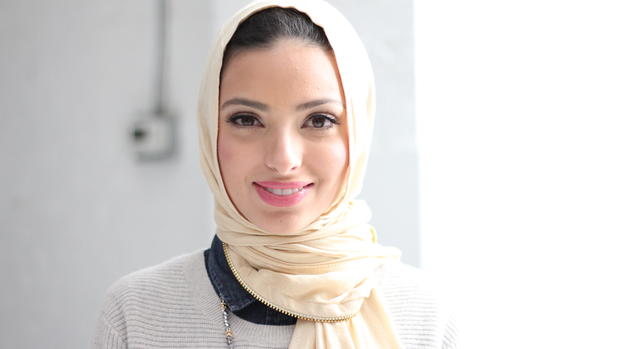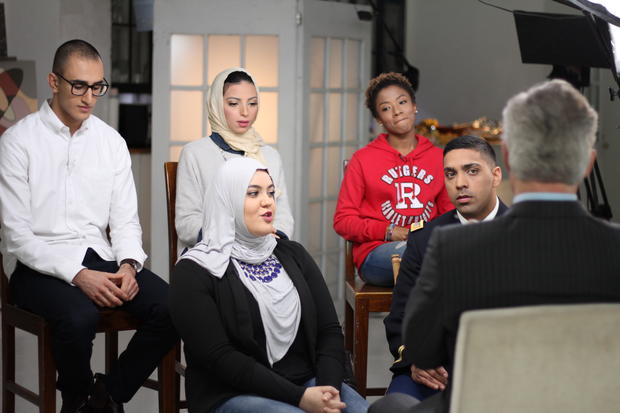Millennial Muslims address backlash after San Bernardino attacks
Donald Trump's proposal to temporarily ban Muslims from entering the U.S., and the attack in San Bernardino, have many of America's five million Muslim's defending their faith.
CBS News sat down with five Muslim millennials, all born and raised in the United States, to discuss what Islam means to them and how they've handled the backlash. On the panel is college student R.J. Khalaf, Army Lieutenant Shahn Khan, nursing student Sameya Omarkheil, college student Taqwa Brookins, and journalist Noor Tagouri.
SCOTT PELLEY: Show of hands, how many of you were born in the United States? Everybody. In a recent poll done by the Public Religion Research Institute, 56% of the Americans they talked to said that the values of Islam are at odds with American values. How does that strike you?
NOOR TAGOURI: I mean, I think it's absolutely absurd for anybody to say that anyway, because we were raised in a way where we believed that you were supposed to follow the law and the values of the land that you live in. And we were born and raised here.
PELLEY: What do you think people misunderstand about the values of Islam?
TAQWA BROOKINS: I think they believe too much that the religion places an emphasis on violence.
PELLEY: Sameya?
SAMEYA OMARKHEIL: It's the person that's violent. Not the religion.
PELLEY: R.J.?
RAFAT "R.J." KHALAF: When you nitpick a certain religion, or you try and find out certain verses from any sort of text, you're going to find the violent verses. The Quran was written in Arabic, which is a deeply metaphorical language, where one word has hundreds of meanings. So if you want to define it in a violent sense, you're going to be able to define it in a violent sense the same way if you want to define it in a peaceful sense, which a billion and a half people do, you're going to be able to do so.
LT. SHAHN KHAN: But there are no verses in the Quran that allow killing of innocent people under any circumstances.
PELLEY: Terrorism, in your view, is outlawed by the Quran?
LT. KHAN: It's outlawed. It's the last thing anyone, any Muslim should be doing.
PELLEY: When you hear of an attack, like the one in Paris, like the one in San Bernardino, and you have to get up and go to work or go to school the next day, what's going through your mind?
OMARKHEIL: Fear.
PELLEY: Sameya, what are you afraid of?
OMARKHEIL: I remember after the attacks had happened, I was terrified because I knew that we would get the backlash for what had happened to all those innocent people.
PELLEY: Have any of you been confronted by somebody on the street? Anybody have words with you?
OMARKHEIL: It was the Monday after the Paris attacks. And I remember that morning, my mother came into my room. And she was telling me, "You know, just wear a hat. Don't go in with your full hijab. Because you never know what can happen in the world." I remember looking at my mom and saying this was my choice. I belong here. I went to school. A man that was leaning against a parking meter, I was walking past him. And he stuck out his leg. He tripped me right in front of everybody. And I fell onto the floor. He threw down his cigarette. And he started screaming in my ear, like, on the right side. He was just like, "Go back to where you came from."
PELLEY: He didn't mean Long Island.
OMARKHEIL: No. That's what I thought he meant, you know? That's where I'm from. I remember the moment I looked at him I thought "Oh my gosh I'm gonna die." I've never felt hate like that before. So it was the first time for me.
PELLEY: There are safety manuals popping up now online. I see your heads nodding. You know what I'm talking about, that talk about Islamic women in public and steps that they should take for their own safety.
OMARKHEIL: My own sister actually had our entire family get together and be like, "Guys, should we sign up for a self-defense course?" Especially after what happened to me, you never know.
PELLEY: Is it necessary?
BROOKINS: Absolutely. Oh, absolutely. The police chief of the Rutgers Police, Kenneth Cop, he approached the [Muslim Students Association] at the university and said, "Look you should let especially the women of your organization know, for example, if you need an escort, just call. Don't walk out around late at night with both earphones in. Keep an eye on your surroundings."
PELLEY: This was the campus police talking to the Muslims Students Association.
BROOKINS: Yes, yes. He approached the Muslim Students Association after the Paris attacks.
PELLEY: Lieutenant, when you decided to join the Army, was there a lot of conversation in the family about that?
LT. KHAN: My friends, my Muslim friends, non-Muslim friends, my brother, just everyone that wasn't in the military, was like "Are you gonna go and kill your own people? This is crazy. What are you doing?" That's when I did my own research, and I found out there's plenty of Muslims serving in the military. There's religious tolerance. There's respect.
PELLEY: I wonder how it strikes your ear, when you hear ISIS in particular, claiming that it's doing everything that it's doing in the name of all Muslims.
KHALAF: It really pisses me off. I mean, they don't represent Muslim. There's nothing Islamic about ISIS. Islam, it comes from the root word, salaam: seen, laam, meem. The three Arabic letters. That literally translates to peace. ISIS goes against the very tenets of it.
TAGOURI: ISIS has a very clear agenda. They want to eliminate any gray zone of Muslims being tolerated in the west. So then we have hateful acts that are carried out and politicians or presidential candidates coming out and perpetuating this hateful rhetoric and giving into what ISIS wants. I mean, I can't tell you, after Donald Trump's proposed ban on Muslims coming into the country, how many articles were finally written about how he is playing into the hands of ISIS.
PELLEY: Sameya, what did you think the first moment that you heard of Donald Trump's proposal to ban all Muslims from entering the United States?
OMARKHEIL: What I'm scared of is the millions of people that follow him, that believe in his ideology of banning Muslims.
PELLEY: R.J., what did you think, when you heard the Trump proposal?
KHALAF: I was in disbelief. I mean, I couldn't believe that the leading contender for the Republican Party was able to say something like this and gain even more support. I don't like to identify myself as a Muslim-American. I'm an American who is Muslim. People don't identify themselves as Christian-Americans or Jewish-Americans. They're Americans the same way I'm a second generation American. So why is there this divide that Donald Trump wants to create and those people that support him want to create, when I'm just as American as them?
LT. KHAN: The reality is, there's gonna be Facebook posts. There's gonna be hate, there's gonna be prejudice, but how are the Muslims that have the knowledge, what are they doing?
PELLEY: The President said, in his address the other night, "It's the responsibility of Muslims around the world to root out misguided ideas that lead to radicalization." So what are you doing about it?
BROOKINS: I don't really think that the problem necessarily is that Muslims aren't doing anything, because that's absolutely not true. When there is a shooter who shoots up a movie theater, and he happens to be white, does the president go on TV and say, "Look, white people. You have to speak up against, you have to root out the crazy people in your communities who are going to go and school up schools"? That doesn't happen.
PELLEY: What do you think of how the media covers terrorism?
KHALAF: Poorly.
TAGOURI: Very poorly. Before any investigation goes on after a shooting or any kind of attack, if the name sounds Muslim, it's a suspected terrorist attack -- every single time. So every Muslim-American is on the edge of their seats like, "What's the name? What's the name? Has the name been released?" Not because of the attack being carried out and how horrendous it was, but because everybody's scared of the backlash.
OMARKHEIL: There's been more terror attacks committed by non-Muslims in America than there have been by Muslims in 2015.
TAGOURI: But because Islam is getting this flack on mainstream media, it forces people in the community who care enough to understand what's going on to be like, "Well, let me look into it. Let me actually talk to American Muslims." So you see how similar we all are. Then when you do that, everybody kind of comes together.
PELLEY: Communication is the antidote to fear.
TAGOURI: Oh, 100 percent.
LT. KHAN: As Muslims, we can't wait for someone to come ask us. We have to communicate. We have to go out there and tell them and educate them. I feel like the generation before us probably wouldn't have had that courage. Because you know, they didn't have to deal with what we're going through with Islam being on the spotlight.
PELLEY: You've grown up with it.
OMARKHEIL: It's the only world we've known. We grew up in a post-9/11 world. It's the only thing we know. You know, we only know about Islam being viewed as hate, whereas, we grew up in a household where Islam is love. It's peace. It's helping one another -- compassion.

